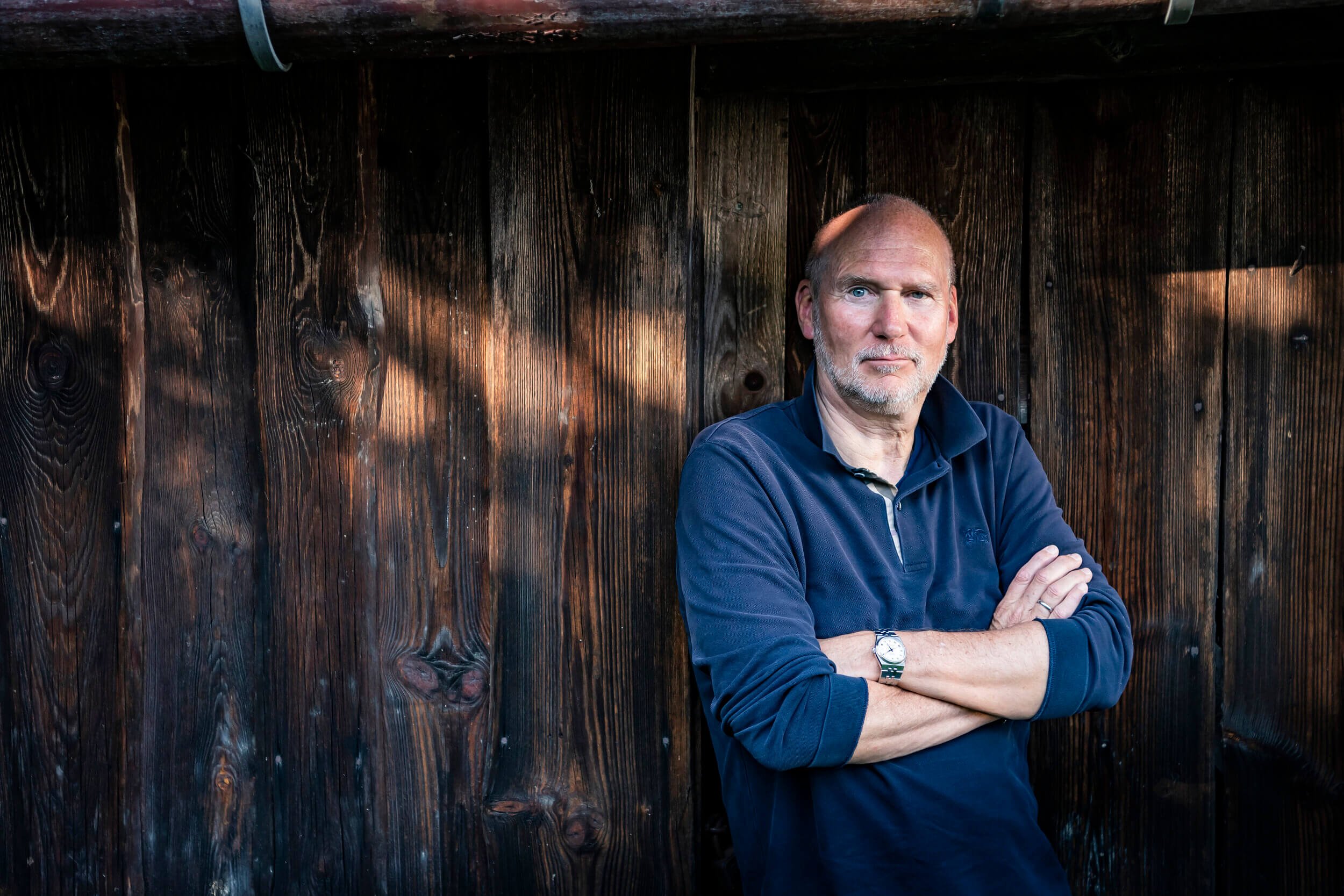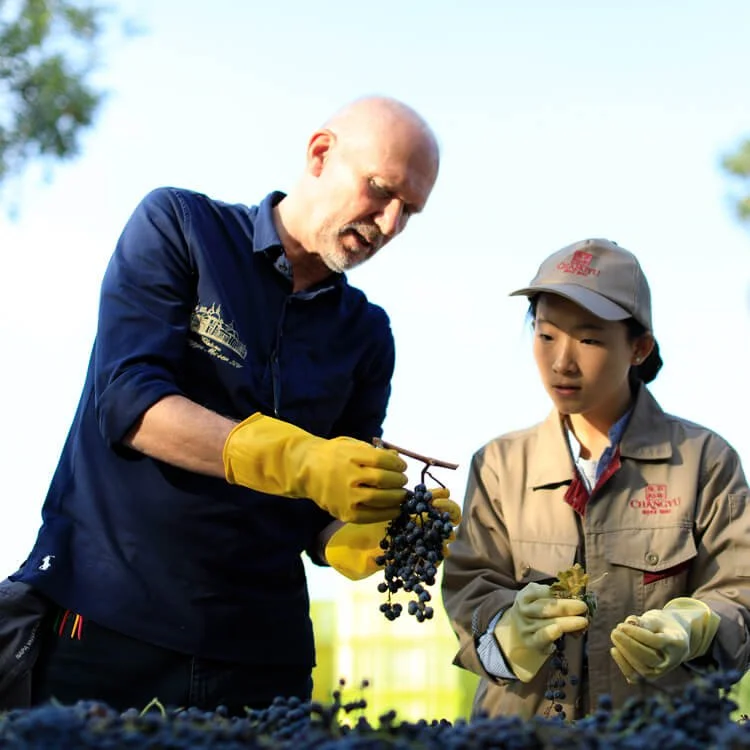▻ Lenz Moser
Elin McCoy in conversation with Lenz Moser
Episode Summary:-
Lenz Moser was born into one of the great wine families of Austria, and in this episode he talks to Elin McCoy for our series of Great Wine Lives. His passion for wine runs in his genes: his grandfather revolutionised viticulture in the 1950s, and his father pioneered biodynamic farming. Lenz has gone from running the family winery to working with Robert Mondavi to making wines in China. He also has several other projects on the go, including a new wine company specialising in Gruner Veltliner.
His grandfather used to take him to the vineyards when he was six years old, showing him the soil and worms and stones, while his father always poured fine wines at the table. Despite this, Lenz did not drink wine until he was 23 years old and spent some time at Almaden winery. “California did the trick in getting me drinking,” he laughs.
His first wine mentors were his grandfather and father, and then at the age of 16, he was sent as a stagaire to Château Kirwan, where he first learnt the art of blending. In 1979, his father started to convert the vineyards to organic and biodynamic. “I have to confess, I thought my father was crazy”, he says. When his father sold the winery, which was Austria’s largest, he stayed on and became General Manager. Then, after 15 years, he had an offer from Michael Mondavi which he couldn’t refuse. He recounts how Mondavi sent him a business-class ticket to San Francisco, and as he had never flown business class, “I was corrupted from day one!” Two months after he arrived, he was running and building up Robert Mondavi Europe. “Bob Mondavi, I knew him for 32 years, he was my biggest influencer or mentor.”
““Bob Mondavi, I knew him for 32 years, he was my biggest influencer or mentor.” ”
California inspired him, not only to start drinking wine, but to return to Austria and persuade his father to change the winery’s brand names, adding varietal labelling, a revolutionary move.
In 2005, Lenz recounts, “I went to China because I was curious, and curious is one of my main features.” He hired a translator in Frankfurt and set about visiting China’s top wineries, which he had discovered via Google. One of those wineries was Changyu, and while he was impressed with their balance sheet, he was not impressed with the quality of their wines. Changyu could sell everything domestically, but Lenz told them they were too expensive and not good enough. He liked the people at Changyu, and for the next ten years blended the wines with what was available. He helped export them, where they sold initially for the novelty factor, but no one re-ordered, due to the quality. After ten years he knew there had to be a game-changer, and he persuaded them to go from producing quantity to a château model, “Making wines that belong with the finest.” He travelled back to China with two suitcases – one with his clothes, the other full of the world’s finest wines, so that he could build an awareness with the team on where Chengyu stood on the world stage.
Ningxia, he believes, is the best place to grow Cabernet Sauvignon: “What is special in Ningxia is the smallest Cabernet Sauvignon berries in the world, because of the desert climate… this gives us a very distinctive style.”
He has his own wine at Chengyu, Purple Air, which is being launched on the Place de Bordeaux. His affection for China is evident: “China is teaching a lesson every day. China is surprising. They keep you on your toes, because they never take things for granted, that is a concept China doesn’t know.” He is now seeing a white-wine boom, as China moves from the domination of red to a more balanced approach.
There are also projects in Europe. During the Covid shut-down, he discussed starting a new company based on Gruner Veltliner with his friend Markus Hube, which they called “New Chapter,” a name chosen by his wife. Ninety per cent of Gruner Veltliner was consumed by German-speaking countries, and Lenz and Markus believed they could broaden its appeal; “it is dramatically different from the rest of the pack, a new concept in making all vineyard sites blend into château-type wine called New Chapter.” Five percent of the blend is a different grape varietal, which adds some complexity to the wines.
Lenz also had a deep family connection to Hungary, and accompanied his grandfather to Tokaj when he was 14 years old. Whilst in Hungary, he met Rita Takaro, locally born, and they decided to form a partnership to produce a dry Furmint; the new wine is named Mad Moser, Mad after the famous Tokaj village.
Is there anywhere else he would like to make wine, Elin asks. Turkey, he answers. Holidays in the south over the years had exposed him to the indigenous grapes of Turkey, which he believes have huge potential. To relax, he likes to go to Dubai, “a glimpse to the future.” As for the challenges the wine industry faces, he thinks the steep decline in consumption is a big concern, for a little-discussed reason: “The wine industry is a little bit lazy… I think we are producing a lot of wines which are not in tune with consumers’ expectations any more.” Lenz concludes by telling Elin that he puts the consumer at the heart of his business – as he explains, “I am a consumer too.”
Running Order:-
-
0.00 – 21.20
“Don’t underestimate luck in your life!”
– Growing up in one of Austria’s great wine families.
– Going to California and learning to drink wine at 23 years old.
– Lenz’s wine mentors.
– Father sells winery and Lenz becomes General Manager.
– Michael Mondavi offers him a job.
– Returning to Austria and changing family’s brands to varietal labelling. -
21.20 – 42.00
“China is teaching us a lesson almost every day. China is surprising, they keep you on your toes, because they don’t take things for granted, that is a concept China doesn’t know.”
– Heading to China in 2005 and visiting the ten biggest wineries.
– Starting his relationship with Chengyu.
– Changing the quality level in Chinese wines.
– Why Ningxia is the best region for growing grapes.
– China begins embracing white wine. -
42.01 – 59.50
“I think we are producing a lot of wines which are not in tune with consumers’ expectations any more.”
– Lenz’s Gruner Veltliner project with Markus Huber “New Chapter” .
– Lenz’s dry Furmint project in Hungary, “Mad Moser” with Rita Takaro.
– Where else Lenz would like to make wine.
– His view of the future of the wine world.
RELATED POSTS
Keep up with our adventures in wine









Hannes Myburg talks to John Stimfig about running the iconic South African Meerlust estate, which is celebrating its 50th vintage.